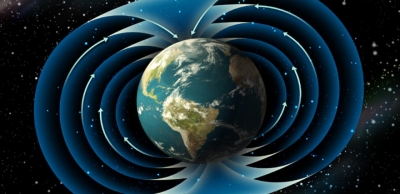
|
The Earth’s outer core is in a state of turbulent convection as the result of radioactive heating and chemical differentiation. This sets up a process that is a bit like a naturally occurring electrical generator, where the convective kinetic energy is converted to electrical and magnetic energy. Basically, the motion of the electrically conducting iron in the presence of the Earth’s magnetic field induces electric currents. Those electric currents generate their own magnetic field, and as the result of this internal feedback, the process is self-sustaining so long as there is an energy source sufficient to maintain convection. |
Unlike Mercury, Venus, and Mars, Earth is surrounded by an immense magnetic field called the magnetosphere. Generated by powerful, dynamic forces at the center of our world, our magnetosphere shields us from erosion of our atmosphere by the solar wind (charged particles our Sun continually spews at us), erosion and particle radiation from coronal mass ejections (massive clouds of energetic and magnetized solar plasma and radiation), and cosmic rays from deep space. Our magnetosphere plays the role of gatekeeper, repelling this unwanted energy that’s harmful to life on Earth, trapping most of it a safe distance from Earth’s surface in twin doughnut-shaped zones called the Van Allen Belts.
But Earth’s magnetosphere isn’t a perfect defense. Solar wind variations can disturb it, leading to “space weather” — geomagnetic storms that can penetrate our atmosphere, threatening spacecraft and astronauts, disrupting navigation systems and wreaking havoc on power grids. On the positive side, these storms also produce Earth’s spectacular aurora. The solar wind creates temporary cracks in the shield, allowing some energy to penetrate down to Earth’s surface daily. Since these intrusions are brief, however, they don’t cause significant issues.
Credit: NASA
Picture credit: Google




